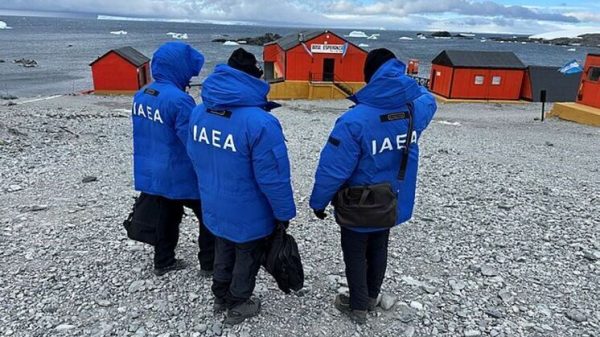The suspect in the massacre that left 51 Muslims dead in Christchurch, New Zealand, allegedly posted a white nationalist screed and link to his Facebook live feed on 8chan, a far-right message board and notorious bastion of hate speech. The suspect in the shooting at a synagogue in Poway, California, that killed one person and injured three, allegedly posted a racist and antisemitic “open letter” on 8chan. And the suspect in Saturday’s attack at a crowded Walmart in El Paso, Texas, which claimed the lives of at least 20 people, is believed to also have posted a white nationalist rant on the platform.
If the connection between the 21-year-old suspect in Saturday’s massacre and the 8chan document is confirmed – and law enforcement sources told NBC News that they are “reasonably confident” that they are linked – then the El Paso attack will mark the third mass shooting in less than six months that was announced in advance on the message board. The first targeted Muslims, the second, Jews, and the third appears to have been aimed at killing Latinos.
Two mass shootings in US leave at least 29 people dead and over 50 injured
Read more
So what is 8chan – and why is a website linked to such a high death count allowed to exist on the open internet?
At its most basic level, 8chan is a website hosting user-generated message boards. Users can create and moderate their own boards about topics ranging from anime and cryptocurrency to politics and video games, or post on established boards. Almost everyone participates anonymously, and the only rule is that users should not post content that is illegal in the United States, such as child-exploitation material.
But extremism has been central to 8chan identity since it was founded in 2013 by a computer programmer and self-proclaimed eugenicist Fredrick Brennan. (Brennan has since distanced himself from his earlier writings and beliefs and has cut ties with the site.)
The site was modelled on another message board called 4chan. But in a key difference, 4chan’s founder had the power to delete individual boards, while Brennan was committed to near absolute free speech. When 4chan banned the discussion of the misogynistic harassment campaign known as Gamergate in 2014, 8chan gained in popularity as a staging ground for the campaign.
8chan has remained a morass of hate speech and bigotry, much of it disguised in layers of ironic or coded language that can make true threats difficult to distinguish from “shitposting”. The site has been tied to numerous “swatting” incidents, whereby anonymous users make fake emergency reports in an attempt to send Swat (special weapons and tactics) law enforcement teams to a target’s home address. It is also home to the QAnon conspiracy theory, a wide-ranging false narrative seeded by an anonymous account known as “Q” who posts his prognostications on 8chan.
Throughout the day on Saturday, 8chan users discussed the massacre and the suspect, with many referring to the alleged shooter as “our guy” and praising the number of people killed. The site’s extremism and connection to violence has prompted calls for a crackdown by various governments, and it was briefly blocked by internet service providers in New Zealand and Australia following the Christchurch massacre.
On Sunday, Brennan said the site should be shut down, telling the New York Times: “It’s not doing the world any good.”
Protection from Cloudflare
8chan would have difficultly operating if it didn’t receive protection from a company called Cloudflare, a US-based company that provides internet infrastructure services to websites, including protection from distributed denial of service (DDoS) attacks. Such DDoS attacks are often used by internet vigilantes to attack extremist sites.
Cloudflare has long taken the position that it should be neutral towards content in providing its services, since it does not host content itself. But in 2017, shortly after the deadly Unite the Right rally in Charlottesville, Virginia, the company’s chief executive officer, Matthew Prince, stopped providing DDoS protection to the extremist neo-Nazi hate site, the Daily Stormer. The site was subsequently forced off the open internet and on to the so-called dark web – areas of the internet that cannot be accessed with a normal web browser. It has since returned to the regular internet.
At the time, Prince expressed deep ambivalence about his decision, telling employees in an email: “This was an arbitrary decision. I woke up this morning in a bad mood and decided to kick them off the internet.” He subsequently told the Guardian: “I am deeply uncomfortable with the decision we made. It doesn’t align with our principles.”
El Paso shooting: what we know so far
Read more
Cloudflare faced renewed public pressure over its protection of 8chan in the wake of the Christchurch massacre. And in a phone interview with the Guardian on Saturday night, Prince reiterated his belief that Cloudflare should not cease to provide services to sites such as 8chan based on their content.
“If I could wave a magic wand and make all of the bad things that are on the internet go away – and I personally would put the Daily Stormer and 8chan in that category of bad things – I would wave that magic wand tomorrow,” Prince said. “It would be the easiest thing in the world and it would feel incredibly good for us to kick 8chan off our network, but I think it would step away from the obligation that we have and cause that community to still exist and be more lawless over time.”
But on Sunday evening, Cloudflare reversed positions, and said it would terminate services for 8chan. “We just sent notice that we are terminating 8chan as a customer effective at midnight tonight Pacific Time. The rationale is simple: they have proven themselves to be lawless and that lawlessness has caused multiple tragic deaths. Even if 8chan may not have violated the letter of the law in refusing to moderate their hate-filled community, they have created an environment that revels in violating its spirit,” the company said in a statement.
Just a day earlier, Prince had argued that keeping “bad” sites within Cloudflare’s network means that the company is able to help monitor activity and flag illegal content to law enforcement. While he would not comment on specifics, he said that Cloudflare receives “regular requests” from law enforcement not to ban certain sites.
“There are lots of competitors to Cloudflare that are not nearly as law abiding as we have always been,” he said. “The minute that someone isn’t on our network, they’re going to be on someone else’s network … If you do a search for the Daily Stormer now, it’s completely available. They’re not gone, and they have bragged themselves that their subscriber counts have gone up.”
Prince also rejected any implication that Cloudflare’s position is self-interested.
“The right answer from a pure business perspective is just to kick them off,” he said of 8chan. “Of the 2 million-plus Cloudflare customers, they don’t matter, and the pain that they cause is well beyond anything else.”
Keeping 8chan within its network is a “moral obligation”, he said, adding: “We, as well as all tech companies, have an obligation to think about how we solve real problems of real human suffering and death. What happened in El Paso today is abhorrent in every possible way, and it’s ugly, and I hate that there’s any association between us and that … For us the question is which is the worse evil? Is the worse evil that we kick the can down the road and don’t take responsibility? Or do we get on the phone with people like you and say we need to own up to the fact that the internet is home to many amazing things and many terrible things and we have an absolute moral obligation to deal with that.”






















































Свежие комментарии